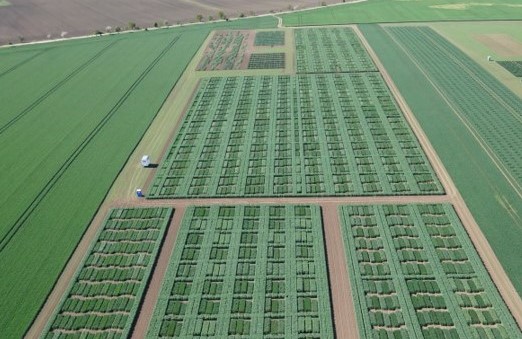Use case 1: Exploiting genotype × location × year × management interactions for sustainable crop production

This use cases addresses challenges in breeding of crops and will exploit possibilities to build up required data management processes that enable genotype × location × year × management interactions.
Partners:
Leibniz Institute of Plant Genetics and Crop Plant Research (IPK)
University of Hohenheim
Use case 2: Assessing tradeoffs for optimal crop nitrogen management

This use cases addresses challenges for process-based crop model applications to optimize nitrogen use.
Partners:
Leibniz Centre for Agricultural Landscape Research (ZALF)
Thünen Institute, Helmholtz Centre for Environmental Research (UFZ)
Deutscher Wetterdienst (DWD)
Georg-August University Göttingen
Use case 3: Streamlining pest and disease data to advance integrated pest management

This use cases addresses challenges in pests and diseases management.
Partners:
Federal Research Centre for Cultivated Plants (JKI)
Zentralstelle der Länder für EDV-gestützte Entscheidungshilfen und Programme im Pflanzenschutz (ZEPP)
Informationssystem für die integrierte Pflanzenproduktion (ISIP e.V.)
Use case 4: Learning from incomplete data

This use cases addresses challenges how to deal with incomplete data on the case of data from long-term experiments.
Partners:
Leibniz Centre for Agricultural Landscape Research (ZALF)
Information Centre for Life Sciences (ZB MED)
University of Bonn
World Agricultural Systems Center of Technical University Munich
Use case 5: Noninvasive phenotyping with autonomous robots

This use cases showcases the potential of multimodal data analytics methods and machine-learning algorithms for in-field plant phenotyping.
Partners:
Forschungszentrum Jülich (FZJ)
University of Bonn
Use case 6: Automated data flows for crop simulation models

This use cases addresses data challenges with respect to the calibration and application of crop models.
Partners:
Technical University Munich
Bayerische Landesanstalt für Landwirtschaft
Weihenstephan-Triesdorf University of Applied Sciences
Directorate General of the Bavarian State Archives
Leibniz Institute for Agricultural Engineering and Bioeconomy

